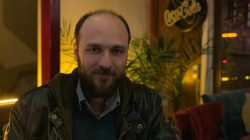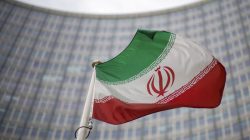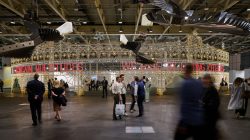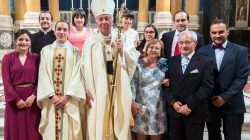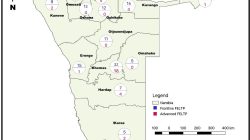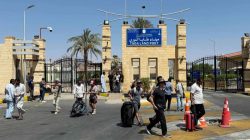On Thursday, European Commission President Ursula von der Leyen was honored with the International Charlemagne Prize, which recognizes significant efforts toward European unification. This accolade comes at a critical time when the 27-member EU faces challenges such as Russia’s conflict in Ukraine, tensions from the previous U.S. administration’s trade disputes, and various security concerns spanning the region.
The EU’s prominent political leader, von der Leyen, was referred to as “the personification of the European spirit” by King Felipe VI of Spain at Thursday’s event in Aachen, Germany.
Last year, members of the European Parliament re-elected her for another five-year tenure as the head of the EU’s influential governing body.
The commission suggests laws for the European Union’s 27 member nations—and their 450 million inhabitants—while ensuring compliance with the regulations overseeing the globe’s largest trading zone. The body consists of a group known as the College of Commissioners who handle various responsibilities akin to those managed by governmental cabinet members, such as farming affairs, economics, market competitiveness, public safety, and immigration policies.
Upon taking office in 2019, von der Leyen spearheaded the European Union’s efforts to obtain COVID-19 vaccinations and strongly backed Ukraine during its conflict with Russia. Given that both France and Germany were experiencing governmental instability at the time, she aimed to assume a more prominent position within the union’s operations.
The administration under President Trump and Europe
The King of Spain and Germany’s Chancellor Friedrich Merz, who were present at the event on Thursday, advocated for enhanced European defense capabilities. This push came amid warnings from US President Donald Trump about potentially scaling back American protective pledges to Europe, which could disrupt the post-World War II framework that has been crucial for maintaining worldwide peace and safety.
Felipe stated, “A definitive statement is emerging from Washington: Europeans need to take greater responsibility for defending their continent.” He emphasized, “This message shouldn’t be taken lightly; its implications are significant. Few people living now remember a time when Europe wasn’t under the primary security umbrella provided by the United States.”
Earlier this month, when Merz’s election signaled Germany’s resurgence as both a diplomatic and economic powerhouse, he highlighted US Vice President JD Vance’s remarks from the recent Munich Security Conference. According to Merz, Vance addressed European values “in his uniquely distinct manner.”
Vance at the time complained about the state of democracy and free speech in Europe, and lambasted German political parties — days before a national election — for their so-called “firewall” against working with far-right parties.
“What we truly uphold is the legacy of our development, our designs, and the values for which we’ve strived over generations—despite numerous setbacks and catastrophes. We defend what matters most to us: liberty and democratic principles,” stated Merz.
Both leaders along with von der Leyen stressed the significance of addressing Trump’s evolving tariff policies with a unified stance.
“Europe will never become a protective continent,” von der Leyen stated.
Recalling Anne Frank
The inaugural presentation of the International Charlemagne Prize took place in 1950 in Aachen. Known as the initial unifier of Europe, Charlemagne owned a favored residence in this western German city during the latter part of the eighth century.
Aachen, located near the Dutch border, gained recognition as the hometown where Edith Holländer, Anne Frank’s mother, was born. The couple later got married at Aachen’s synagogue; however, this place of worship was razed during the Kristallnacht, often referred to as the “Night of Broken Glass,” an event in November 1938 when the Nazis persecuted Jewish communities across Germany and Austria.
Following Adolf Hitler’s ascent to power, the Frank family subsequently departed from Germany and ultimately went into seclusion in 1942 within a concealed section of Nazi-occupied Netherlands. Tragically, they were apprehended and dispatched to concentration camps; only Otto Frank survived this ordeal.
Anne Frank’s renowned diary came into public light following the conclusion of World War II.
During her address on Thursday, Von Der Leyen discussed the Frank family, the synagogue, and the significance of the city to European history—and its future.
In Aachen today, a new synagogue has been inaugurated,” von der Leyen stated. “It stands as a sign of renewal and resurgence, yet it also serves as a poignant reminder. It urges Europe to stay vigilant and resist anyone spreading hate and attempting to fracture our community.
Provided by Syndigate Media Inc. (
Syndigate.info
).

